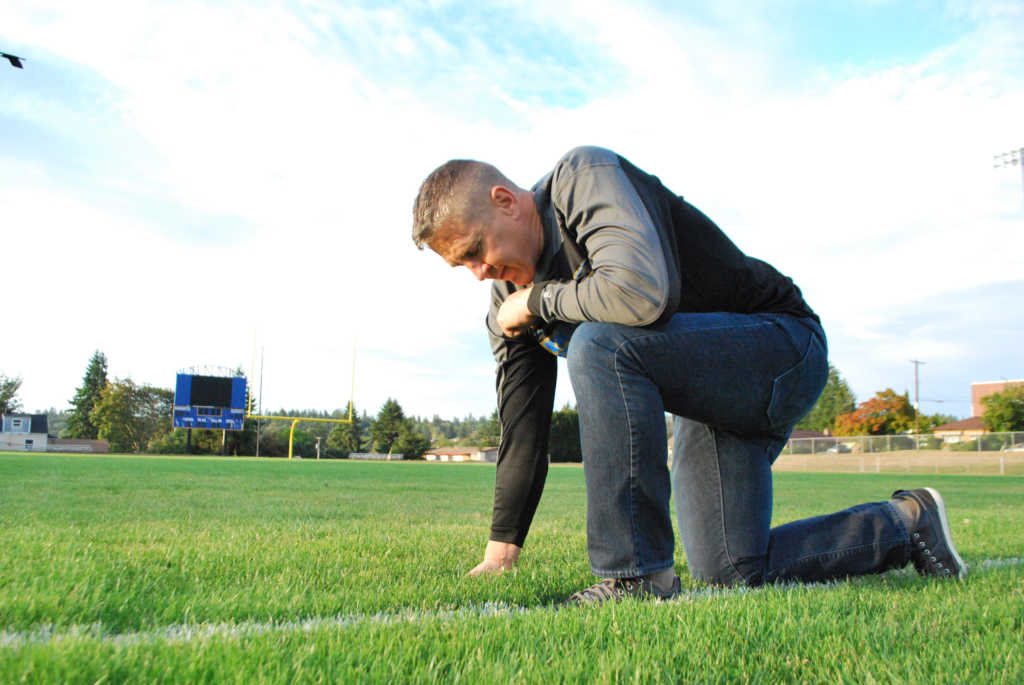A high school coach who was fired for leading prayers at the 50-yard line has lost his legal battle against a Washington state school district, with the 9th Circuit Court of Appeals finding that the Bremerton School District was within its rights to punish him.
Coach Joe Kennedy’s case has attracted a fair amount of attention over the past two years, with critics doubling down on either side of the First Amendment divide. Were his prayers private and constitutionally protected — or had he crossed the line? Those were the central questions at the center of the dispute.
The coach’s attorneys had argued before a three-judge panel of the 9th Circuit Court of Appeals earlier this summer that the former coach’s prayers were private and held after football games concluded and were, thus, entirely legal, but those claims clearly didn’t sway the justices.
In fact, they ruled that Kennedy “took advantage of his position to press his particular views upon impressionable and captive minds before him.” The decision means the coach won’t be reinstated. The opinion read (as per TheBlaze):
Kennedy’s demonstrative speech thus occurred “while performing a function” that fit “squarely within the scope of his position.” Id. After all, Kennedy spoke at a school event, on school property, wearing BHS- logoed attire, while on duty as a supervisor, and in the most prominent position on the field, where he knew it was inevitable that students, parents, fans, and occasionally the media, would observe his behavior.
In sum, Kennedy’s job was multi-faceted, but among other things it entailed both teaching and serving as a role model and moral exemplar. When acting in an official capacity in the presence of students and spectators, Kennedy was also responsible for communicating the District’s perspective on appropriate behavior through the example set by his own conduct.
Mindful of those facts, by kneeling and praying on the 50-yard line immediately after games while in view of students and parents, Kennedy was sending a message about what he values as a coach, what the District considers appropriate behavior, and what students should believe, or how they ought to behave. Because such demonstrative communication fell well within the scope of Kennedy’s professional obligations, the constitutional significance of Kennedy’s job responsibilities is plain — he spoke as a public employee, not as a private citizen, and his speech was therefore unprotected. …
Here, an ordinary citizen could not have prayed on the 50-yard line immediately after games, as Kennedy did, because Kennedy had special access to the field by virtue of his position as a coach. The record demonstrates as much. Representatives of a Satanist religion arrived at the stadium “to conduct ceremonies on the field after [a] [BHS] football game[.]” They were forced to abandon this effort after they learned that the field was not an open forum. Thus, the precise speech at issue — kneeling and praying on the 50-yard line immediately after games while in view of students and parents — could not physically have been engaged in by Kennedy if he were not a coach. Kennedy’s speech therefore occurred only because of his position with the District.
Michael Tierney, a lawyer for the district, had previously said in court during oral arguments that Kennedy’s prayers were a violation of the First Amendment’s Establishment Clause, decrying pressures that prayers like Kennedy’s could put on students, the Kitsap Sun reported.
After those oral arguments were heard earlier this summer, Kennedy told reporters that the case isn’t about money, and that he had hoped to be victorious so that he could once again be a coach.
“I want to be a coach,” he said. “I want to be out there with my young men.” It appears the latest ruling is a blow to any such prospect.
As Faithwire previously reported, Kennedy — who coached Bremerton High School’s junior varsity team and was an assistant coach for the school’s varsity team — first came under fire in September 2015 when the district learned that he was leading prayers before and after games and responded by reminding staff that employees cannot pray publicly in schools, according to the Kitsap Sun.
The football coach was placed on leave after he reportedly defied that order and prayed on the 50-yard line after a football game — an act he had partaken in since he joined the district in 2008.
Listen to Kennedy explain his legal battle in his own words below:
After his contract wasn’t renewed in 2016, Kennedy sued, arguing that the post-game prayer wasn’t a violation of the First Amendment because it unfolded after the game concluded and simply involved him walking to the 50-yard line, bowing and praying. The school district, though, feared that his prayers would spark legal ramifications.
It is unclear if Kennedy and his legal team will appeal.



